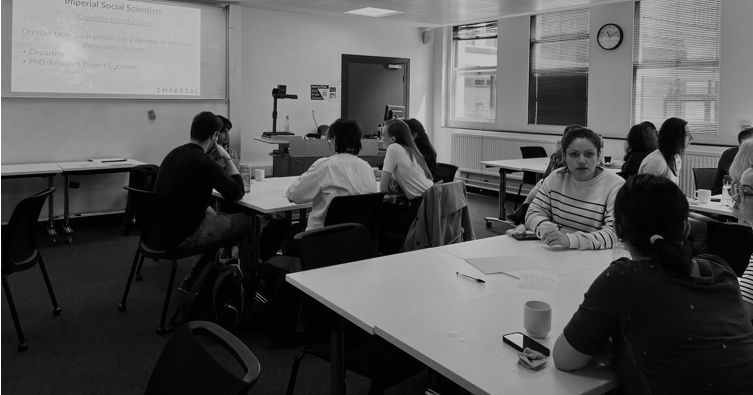 By Lauren Shields, PhD Student in the Centre for Higher Education Research and Scholarship
By Lauren Shields, PhD Student in the Centre for Higher Education Research and Scholarship
On Monday 10th June 2024, over 20 PhD and Early Career Researchers from across all four Imperial faculties met in a first-of-its-kind networking event. As a PhD social scientist in a STEMMB institution, it can be hard to find other researchers conducting similar research to you. We are often either isolated in departments or are lacking targeted training or collaboration sessions with others in the same institution. I wanted to host an event that would bring these researchers together, to form connections and learn from each other, as well as celebrate the hugely important offerings that social science can bring to physical science.
The 3 hour session began with a fascinating keynote speech by Dr. Stephen Webster, who is currently leading the Good Science Project and who was formerly the Director of the Science Communication Unit for 15 years. He discussed the benefits and challenges of researching at the interface of the physical and social sciences, particularly in an institution such as Imperial that is dominated by physical and applied sciences. Taking a philosophical approach to his talk, Dr. Webster walked us through the evolving debates surrounding the nature of the social sciences and showed how the natural sciences can benefit from social science approaches to research.
We then heard from Prof. Arnab Majumdar, Head of External Partnerships at the London Interdisciplinary Social Sciences Doctoral Training Partnerships, who reminded us about the training opportunities available through the LISS-DTP on the social sciences.
The final part of the session was a chance for us all to discuss different social science methodological approaches to our research. We each chose a particular research method, ranging from ethnography to arts-based methods, and shared our experiences of using such methods and their associated challenges. We learned best practice from each other and made connections with those conducting similar research.
The event ended with a new social media group set up for the attendees, and a will for further opportunities to bring this unique but highly important group of researchers together in our STEMMB focussed institution. Ideas raised included a social science careers fair, research symposiums for PhD students at Imperial, workshops in conjunction with social sciences staff.
Some comments received after the session include:
‘Thank you so much for your effort. One of the best, if not the best, events I have attended at Imperial.’
‘[I enjoyed] the talks by both speakers as well as knowing that there are many researchers who […] use social science theories or methodology. Knowing that this is a shared experience and [to] discuss it with other researchers is helpful.’